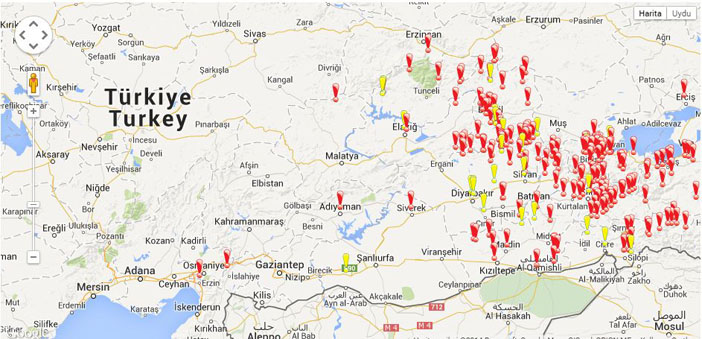Toplu Mezarlar Vakfı kuruluyor


Türkiye’nin yakın tarihi, aynı zamanda bir katliamlar tarihi. Binlerce insan, hâlen toprak altında. Kim oldukları, ne zaman katledildikleri bile bilinmiyor. 1915 Soykırımı ve 1990’larda giderek şiddetlenen Kürt savaşından sonra, nerede bir kazı yapılsa altından kemikler çıkıyor. Çağrılar yapılıyor, savcılıkların kapısına gidiliyor, ancak devlet halen bu konuda hiçbir somut adım atmış değil. Savcılık soruşturmalarından sonuç alınamıyor.
Toplu mezarlar gerçeği, insan hakları örgütlerinin yıllardır gündeminde. Özellikle, İnsan Hakları Derneği Diyarbakır Şubesi, uzun süredir toplu mezarların yerlerini tespit etmeye çalışıyor. Dernek, tespit edebildiği yerlerin bir haritasını da hazırladı. 16 Aralık Salı günü açıklanan rapora göre, 348 toplu mezarda 4 bin 201 kişinin cesedi var. Hazırlanan raporda, 1915 Soykırımı’na ait veriler yer almıyor.
İnsan hakları örgütlerinden güç birliği
Türkiye’de faaliyet gösteren çeşitli insan hakları örgütleri, toplu mezarlarla ilgili çalışmalar yürütüyor. Daha etkili bir çalışma yapabilmek için ortak hareket etme kararı alan insan hakları örgütleri, İHD’nin öncülüğünde ‘Toplu Mezarlar Vakfı’ kuruyor. Vakfın kuruluşu için yapılan çalışmalar, büyük oranda tamamlanmış durumda. Türkiye İnsan Hakları Vakfı, Hakikat ve Hafıza Merkezi’nin de aralarında bulunduğu insan hakları örgütleri, bu projeye destek veriyor.
İHD Diyarbakır Şube Başkanı Raci Bilici, vakfın yakın zamanda kurulacağını belirterek şunları söyledi: “İHD oldukça sınırlı imkânlarla çalışıyor. Gerek maddi, gerekse de insan kaynağı açısından zorlanıyoruz. Bir süredir, yalnızca bize yapılan başvurular üzerine çalışıyoruz. Toplu mezarlar çalışması, daha çok maddi ve insan kaynağı gerektiren bir çalışma. Bu nedenle, ayrı bir vakıf kurarak bilimsel destek de alabilen bir çalışma yapılması zorunluluğu var.”
Bilici, toplu mezarların ortaya çıkartılması için yapılacak çalışmaların, 1915 Ermeni Soykırımı, 1925 sonrasında yaşanan Kürt isyanları ve Kürt savaşında yaşananlar olarak dönemlere ayrılarak yapılacağını dile getirdi.
İHD 348 toplu mezar tespit etti
İHD Diyarbakır Şubesi, güncellediği toplu mezarlar raporuna göre, Türkiye'de açılmış ve açılmamış olmak üzere 348 toplu mezarda 4 bin 201 kişiye ait ceset var. Rapora göre, toplu mezarların yoğunlukta olduğu iller, Diyarbakır, Siirt Bitlis, Hakkari ve Bingöl. Hazırlanan ‘Toplu Mezar Haritası’, Kürt savaşının yoğunlukta olduğu dönemleri içeriyor. Raporda, şimdiye kadar yapılan kampanyalara, çağrılara ve suç duyurularına rağmen devletin somut herhangi bir adım atmadığına dikkat çekiliyor.
DNA bankası oluşturulsun
İHD, hazırladığı raporda, kayıplarla ilgili olarak savcılara da harekete geçme çağrısında bulundu. İHD, ayrıca askeri ve sivil yetkililerin ellerindeki belgeleri ortaya koymasını, o belge ve bilgilere göre yapılacak bir çalışmanın sonrasında mezarların açılmasını ve kurulacak DNA bankasıyla da kayıpların kimliklerinin tespit edilmesini istedi. Raporda, “Türkiye, artık bölgede yaşanan toplu mezarlar gerçeğiyle yüzleşmeli. Bu mezarların açılması konusunda yetkililerin bir an önce harekete geçmesi gerekmektedir” ifadelerine yer verildi.
Hakikatleri Araştırma Komisyonu kurulması çağrısının da yapıldığı İHD raporunda, uluslararası standartlara dikkat çekildi: “Kayıpların aranması ve mezarların açılması, Minnesota Otopsi Protokolü ve mezar açmayla ilgili uluslararası standartlara göre yürütülmeli. Mezarların iş makineleriyle özensiz bir biçimde açılarak kayıplara ait buluntuların tahrip edilmesinin veya kaybolmasının önüne geçilmelidir.”
Siirt’te 48 toplu mezar
Siirt, 1915 öncesinde Ermenilerin yoğun yaşadığı merkezlerden biri. 7 bin 500 kişilik Siirt merkezinde, 1914’te 4 bin 32 Ermeni yaşıyordu. Üç kilisesi ve iki eğitim kurumu olan Siirt, yalnızca Ermenilerin değil, Süryanilerin de önemli bir yerleşim merkeziydi. Ermenilerin katledilmesi ise, hafızalarda tazeliğini korumaya devam ediyor. Ermenilerin toplu halde katledildikleri yerleri, kentte hemen herkes biliyor.
Hrant Dink Vakfı Yayınları’nın yayımladığı ‘Sessizliğin Sesi’ adlı kitapta, Eruhlu bir Ermeni, 1915’e dair şunları anlatıyordu: “Babam derdi ki, ‘Sana gâvur diyecekler, öbürlerine de diyorlar ama seslerini çıkarmıyorlar. Seni öldürmezler, dayağını ye, sesini çıkarma, gel evine. Bir yerin kırılsa da sesini çıkarma.’ Bu bilinci, babam bana verdi. Öyle dayak yiye yiye büyüdüm. Yedi sekiz yaşlarında iken, büyük adamlar beni kulaklarımdan tutup yere vuruyorlardı, ‘Gâvurdur, kemiği kırılmaz, sağlamdır’ diyorlardı. Bizim orada bir uçurum (Tehtameterxanê) vardı. Oradan insanlarımızı atmışlardı, kemikleri üst üsteydi, beni o uçurumlara götürürlerdi. ‘Dedelerinin kemikleri orada, seni de oraya atacağız’ diye tehdit ederlerdi.(…)”
Kasaplar Deresi ortak kıyım yeri
1915’in ardından, kent hızla Kürtleşmeye başladı. Kürt siyasi hareketinin önemli merkezlerinden biri olan Siirt’te, 1989'da 300’den fazla kişi PKK militanı olduğu gerekçesiyle öldürülerek Newala Kasaba olarak bilinen Kasaplar Deresi’ne atılmıştı. Newala Kasaba da aynı zamanda Ermeni Soykırımı’nın yaşandığı yerlerden biri olarak biliniyor.
İnsan Hakları Derneği (İHD) Siirt Şubesi, Newala Kasaba’daki toplu mezarın açılarak, katledilenlerin kimliklerinin tespit edilmesini istiyor. İHD, Siirt’te tespit ettikleri toplu mezarlara dair bir de rapor hazırladı. İHD raporuna göre, Siirt’te en az 822 kişinin bulunduğu 48 mezar tespit edilmiş durumda. Mezarlarla ilgili yapılan başvuruların hiçbirinden sonuç alınmış değil. Sadece, 1989’da savcılık emriyle Newala Kasaba’da yapılan kazıda, 8 kişinin cesedine ulaşıldı. Ancak, savcılığın yaptığı kazının ve arkasından başlatılan soruşturmanın akıbeti meçhul. Kimlik tespitleri bile yapılamamış.
Uçurumlardaki kemikler
İHD raporunda Newala Kasaba’yla ilgili şu bilgilere yer veriliyor: “Ülkemizin ve özelde ilimizin de karanlıkta kalmış ve açığa çıkarılmayı bekleyen olayların cereyan ettiği yerlerden biri de Newala Qeseba’dır. Yüzlerce binlerce insan yaşamını yitirmiş, insanlık ailesinin büyük bir üzüntü ve utanç ile yâd ettiği toplu ölümler ve toplu mezarlar gerçeği oluşmuştur. Newala Qeseba da yüzlerce Ermeni ve Kürt vatandaşların toplu olarak gömüldüğü bir yer durumuna getirilmiştir.”
İHD Siirt Şube Başkanı Zana Yavuz da, şimdiye kadar yapılan hiçbir başvurudan sonuç alınamadığını ve kentteki bazı yerlerde katledilen Ermenilerin kemiklerinin bulunduğunu söyleyerek, Agos’a şu değerlendirmelerde bulundu: “Siirt Ermenilerin ve Süryanilerin kentiydi. 1915’ten sonra Kürt şehrine dönüştü. Bunu kentte herkes bilir. Tehtameterxanê ve Newala Kasaba da Ermenilerin katledildiğini de herkes biliyor. Tehtameterxanê uçurumunun kayalıklarında hâlâ kemikler bulunuyor. ”


